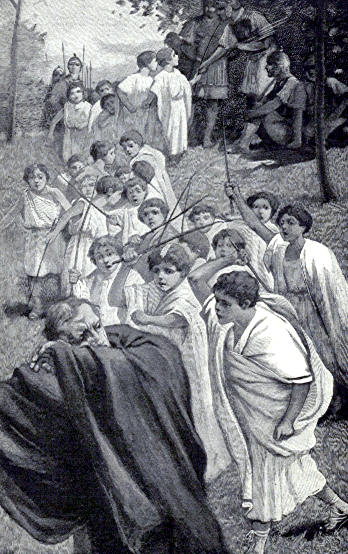Story of the Romans - Helene Guerber |
The School-Teacher Punished
The war with Veii was soon followed by one against the city of Falerii, and here too the Roman army found it very hard to get possession of the town. One day, however, a school-teacher came to Camillus, bringing his pupils, who were the sons of the principal inhabitants of Falerii.
Camillus was surprised to see the strange party coming from the city, but his surprise was soon changed to indignation, for the faithless schoolmaster offered to give up the children confided to his care. He said that their parents would be quite ready to make peace on any terms, as soon as they found that their sons were prisoners. Instead of accepting this proposal, Camillus sent the children back to their parents; and he gave each of them a whip with directions to whip the dishonest schoolmaster back into the city.
 The School-Teacher Punished. |
When the parents heard that their children owed their liberty to the generosity of the enemy, they were deeply touched. Instead of continuing the war, they offered to surrender; and Camillus not only accepted their terms, but made them allies of Rome. Thus a second war was ended by his efforts, and the Romans were again victorious.
In spite of his successes abroad, Camillus was not a favorite at home. Shortly after his return from this last campaign, the Romans, who disliked him, accused him of having kept part of the spoil which had been taken at Veii.
This accusation was false; but, in spite of the protests of Camillus, they persisted in repeating it, and finally summoned him to appear before the magistrates, where he would be tried. This was very insulting, but Camillus would have complied had there been any hope of having an honest trial.
As all those who were to judge him were his enemies, he refused to appear before the court, and preferred to leave his city and go off into exile. But when he passed out of the gates, he could not restrain his indignation. Raising his hands to heaven, he prayed that his countrymen might be punished for their ingratitude.
This prayer was soon answered. Not long after Camillus had left Rome, the Gauls, a barbarous people from the north, came sweeping down into Italy, under the leadership of their chief, Brennus.
These barbarians were tall and fierce; they robbed and killed with ruthless energy wherever they went, and, in spite of every obstacle, they swept onward like a devastating torrent. Before the Romans could take any steps to hinder it, they appeared before the city of Clusium, and laid siege to it.
The Clusians were the friends and allies of the Romans, and the latter sent three ambassadors of the Fabian family to command the Gauls to retreat. Brennus received them scornfully, and paid no heed to their commands.
Now it was the duty of the Fabii, as ambassadors, to return to Rome and remain neutral. Instead of this, the men sent a message to Rome, joined the Clusians, and began to fight against the Gauls.
Although he was only a barbarian, Brennus was furious at this lack of fairness. In his anger he left the city of Clusium, and started out for Rome, saying that he would make the Romans pay the penalty for the mistake of their ambassadors.